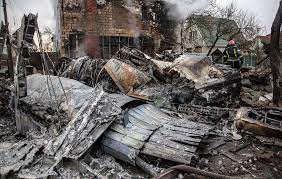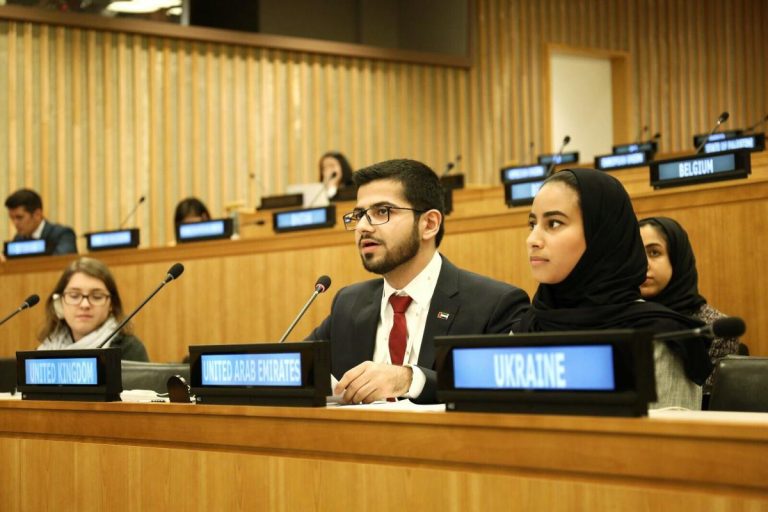With a notice on its Facebook page, the Ukrainian Embassy in Abu Dhabi announced the UAE’s decision to suspend the visa waiver for Ukrainians traveling to the Gulf State.
This happened a week after the Russian invasion of Ukraine causing a huge influx of refugees, to the point that UN sources predict around 10 million people to leave the country.
But it also comes after the UAE’s abstention from the vote on the Resolution of the UN Security Council presented by Albania and the United States, to condemn Russia’s attack on Ukraine.
The UAE took a temporary seat on the Security Council this year for 2022-23 and this has placed them in an extremely sensitive position.
Abu Dhabi declares that it intends to pursue political equidistance between the parties and has announced $ 5 million in aid to the Ukrainian people. But clearly at this time equidistance is difficult to be sustained without damaging relations with the United States.
US Secretary of State Antony Blinken’s request to Sheikh Abdullah bin Zayed al-Nahyan, “about the importance of building a strong international response to support Ukrainian sovereignty”, was ignored during the vote and the Emirates joined China and India in abstaining.
“The position of the UAE is firm on the basic principles of the United Nations, international law, State sovereignty and the rejection of military solutions,” Anwar Gargash, the Emirati president’s advisor for diplomatic affairs, said on February 26 in a tweet.
However, Abu Dhabi’s cautious line had already emerged on February 23, a day before the Russian offensive against Ukraine, when the Emirati Foreign Minister, Abdullah bin Zayed Al Nahyan, discussed with his Russian counterpart, Sergey Lavrov, on “regional developments and issues of common interest” during a telephone conversation.
On that occasion, Bin Zayed underlined “the strength of relations between the United Arab Emirates and the Russian Federation and the leadership of the two countries, and the desire to improve the prospects for cooperation between the Emirates and Russia in all fields to achieve their mutual interests “.
For decades, the two Gulf powers, the United Arab Emirates and Saudi Arabia, they went the same speed to America’s pass, but the Glass Palace’s abstention underscores how they are pursuing more independent foreign policies as they deepen relations with adversaries of Washington as Moscow and Beijing.
Meanwhile, the Emirati abstention preceded the approval by the Security Council on the renewal of the arms embargo against the Houthis in Yemen.
With 11 votes in favor and four abstentions, the resolution proposed by the United Arab Emirates passed to the UN Security Council extending the arms embargo to all Houthi rebels and labeling for the first time the pro-Iranian group established in Yemen, as a “terrorist group”.
The resolution also condemns the series of attacks launched in recent weeks against the Gulf countries, in particular in Saudi Arabia and the Emirates.
Russia, usually on positions of solidarity with Iran, which supports the Houthis, this time voted in favor of the resolution presented by the Emirates. A move that now appears to be a veritable exchange of favors: Moscow’s vote in exchange for Abu Dhabi’s abstention in the votes on the Russian invasion of Ukraine.
Various factors affect the caution of the Emirates and other Arab countries in condemning the Russian invasion.
Abu Dhabi like Moscow is part of the OPEC + group of oil producing countries. Although oil prices have soared above $ 100 a barrel, Riyadh has resisted US pressure to pump more oil. Ryadh hinted that the relationship with Russia in this area is a fundamental strategic relationship for the kingdom’s economy.
Exports of Russian and Ukrainian wheat occupy most of the imports of Arab countries. The sale of arms occupies another space in the list of interests.
Moscow has relied on the arms trade to restore its position in the Middle East. The war in Yemen has also pushed Saudi Arabia and the United Arab Emirates to conclude arms purchase agreements with Russia in recent years.
Saudi Arabia has established military and trade cooperation with Russia in recent years and unlike Washington and its Western allies, Moscow does not place conditions on its arms exports, making it an attractive asset.
Most Gulf states have for decades seen the United States as the guarantor of their security. But now the Gulf monarchies, if on one hand they remain loyal to Washington, on the other they don’t want to get their hands tied too much.
Both the UAE and Saudi Arabia believe that US administrations have disengaged from the Middle East.
Over the years they have clearly expressed their discontent with US policies both during the Arab Springs and with Iran on the signing of the nuclear deal in 2015, or what they see as a weak response to ’Houthi in Yemen. Abu Dhabi has always demanded that Washington designate the Houthis as a terrorist organization.
The Kremlin has become a key player in the Middle East and visibly to the detriment of the White House. In 2015, a year after the annexation of Crimea, Putin intervened in Syria in support of President Bashar Assad, sending a clear message to the Arabs and the United States, turning the tide of the Syrian civil war.
Other Abu Dhabi concerns emerged when it suspended talks with the Biden administration over the UAE’s offer to purchase US-made F-35 jets.
Last but not least, President Joe Biden also annoyed Riyadh by criticizing human rights violations and refusing to speak to Crown Prince Mohammed bin Salman, the ruler of the kingdom.
So, without a doubt, the reading of the Emirati abstention it is something the West should reflect with caution. The determination, compactness and speed of actions in Ukraine as a response to the Russian occupation are crucial. Not only for the fate of Ukraine itself, but of our democracies and also decisive in relation to other countries in the Baltics and northern Europe, as well as with Turkey and the Arab countries in the Middle East. Showing the limits of power of the Siberian bear will probably serve to fill gaps left in pursuit of the international order.

Read also: Russia has launched a genocide in Ukraine
Post Author
Author
-

Researcher on International Relations Middle East and Balkans
View all posts
CSSII- Centro Interdipartimentale di Studi Strategici, Internazionali e Imprenditoriali,
Università di Firenze, Italy, Albania




